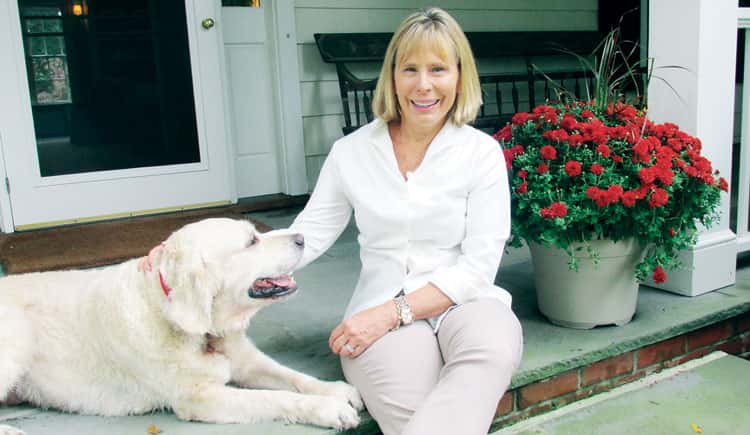

By Anne W. Semmes
Sentinel Correspondent
Jill Woolworth, a marriage and family therapist, who works often with her golden retriever therapy dog, Hank, at the Greenwich Center for Hope and Renewal, has created a playful and persuasive shorthand she calls “word pictures” to help us deal with our common concerns, and how best to relate with each other.
It’s all there, 64 “Common Concerns” in her new book, “The Waterwheel.”
“Playfulness pushes out a lot of toxicity or the potential for us to get dragged down by it,” is how Woolworth describes her word picture approach.
Take, for example, her “Grace Sandwiches” entry No. 30. A drawing illustrates how to deliver a difficult message. The top and bottom sandwich slices of bread are labeled “Affirmation,” with “Hard Message” as the filling. What’s needed, Woolworth said, is to first affirm or appreciate the target person before delivering that difficult message, then “express your confidence that the person will do the right thing.”
Woolworth’s word pictures came to her through her 25 years of counseling and leading small groups. “Swiss Cheese” (No. 13) represents the “holes of our humanity through which we connect with each other.”
“We all want to look like a block of cheddar,” said Woolworth. “But Swiss cheese offers us creative spaces to make changes, to see ourselves differently. Word pictures aren’t threatening. They’re not labels.”
Woolworth organizes her word pictures under the categories: Self-Talk, Relationships, Difficult Situations, Losses, Marriage/Partnering and Parenting.
She chose the title of “The Waterwheel” as “a perfect image for the idea that we are all pouring ideas into one another, and being poured into.” A waterwheel traces back to her childhood living in a converted gristmill in Connecticut.
She depicts her formative life as “a mosaic.” She believes, “There is no single path in our lives that we must ‘find,’” as she writes under “Mosaics & Seasons” (No. 7). Her path included years of overcoming an eating disorder, earning a degree in French Literature; a commercial banking career in New York City; marrying and moving to Greenwich, and having three daughters while singing with the Grace Notes; co-founding the nonprofit Women of Vision Fairfield County, then getting a master’s degree to become a marriage and family therapist.
Woolworth sums up in the affirmative, “My life makes sense looking backwards. So many people in their 20’s are so frantic about finding their calling, their path, their career. The angst is unnecessary as long as they are engaged in something meaningful and productive. Ultimately it will all build on itself.”
It was not until Woolworth cleared her desk and took off for 18 months on a sabbatical to Stanford University with her husband, Rick, that she put her mind to gathering those word pictures into a book. At Stanford, she encountered just the right artist to illustrate those word pictures, a sophomore from Tennessee.

“Wajih Chaudhry is one of the most hardworking, creative young man I’ve ever met. He would often come up with ideas I had not thought of,” she said.
With her book now out there, Woolworth is experiencing connections to her mosaic-styled life. “I have people who found me on the internet and felt they could trust me because I had a career in banking.” Another could see working with her because she spoke French.
“Other people have been appreciative of my not-for-profit work, or the fact that I could sing acapella. You never know what is going to make people feel comfortable,” she said. “Men seem to like it, teens and twenties seem to like it, I think because it’s simple and authentic and accessible. It combines both whimsy and wisdom. It’s the wisdom that has been poured into me over the years.
“It’s about being honest,” added Woolworth, who is decidedly up front with her past battle with bulimia. It’s also about banning the words: But, Always, Never, and Should, or B.A.N.S. (No. 19). “If somebody says, ‘My husband never…,’ chances are he probably has on occasion. I believe that intimacy is into-me-see. If we don’t feel seen and known and cared for, there’s no way we are going to change. We’re just going to feel criticized or shamed.”
That’s why she says she developed the acronym L.O.V.E. (No. 51): Listen, Open-space, Validate, and Empathize. “Men like this one,” Woolworth said. “They find it very helpful. ‘Tell me more of what happened, honey.’ Open up space for her to talk. Then validate that it took place. Then empathize: ‘That would make me furious, too.’”
Of those 64 nuggets of Woolworth wisdom, the author says, “There isn’t one that I haven’t lived through myself.” But of all those “amalgamations of personal and professional experiences,” she cites one entry especially autobiographical: No.16, Kindness.
Babysitting during her single days, her boyfriend came to help out. “He was so kind with the little boy in the high chair, I said to myself I want that man to be the father of my children. And he is. That’s why in over these 40 years of marriage, I’ve come to believe that the single most important quality to look for in a partner, or a colleague, or a friend is kindness and it often shows up in actions or words that people don’t think are visible.”
Woolworth’s friend, Debbie Reynolds, who has organized an upcoming “Relationship Wisdom” talk by Woolworth, cites the book’s effective examples of Woolworth’s simple yet profound messages to improve one’s relational skills: “Nature reboots the brain,” “Kindness is the most important character trait,” and, “Hurt people hurt people.”
The Rev’d Dr. Heather Wright, who directs the Greenwich Center for Hope and Renewal, goes a step further in her praise of “The Waterwheel.”
“These short meditations on self-care, relationships and hope feed the soul,” she said.
“The Waterwheel” is available at BarnesandNoble.com and at Amazon.com.



